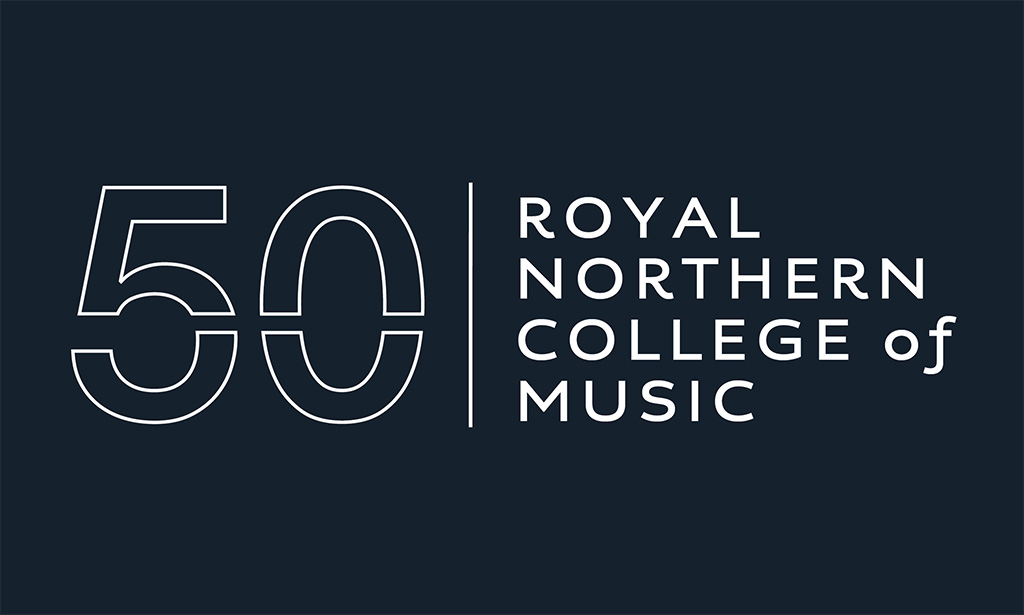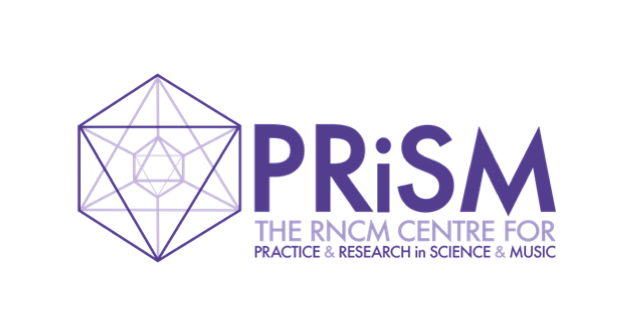Lucy Hale Day of Music, Disability and Technology (3 February 2023)
Lucy Hale Day of Music, Disability and Technology
Friday 3 February 2023
Various Venues
As part of the RNCM’s first ever Disability Awareness Week, the College presents the Lucy Hale Day of Music, Disability and Technology, in collaboration with Drake Music and PRiSM, directed by composer Megan Steinberg and co-directed by composer Ben Lunn.
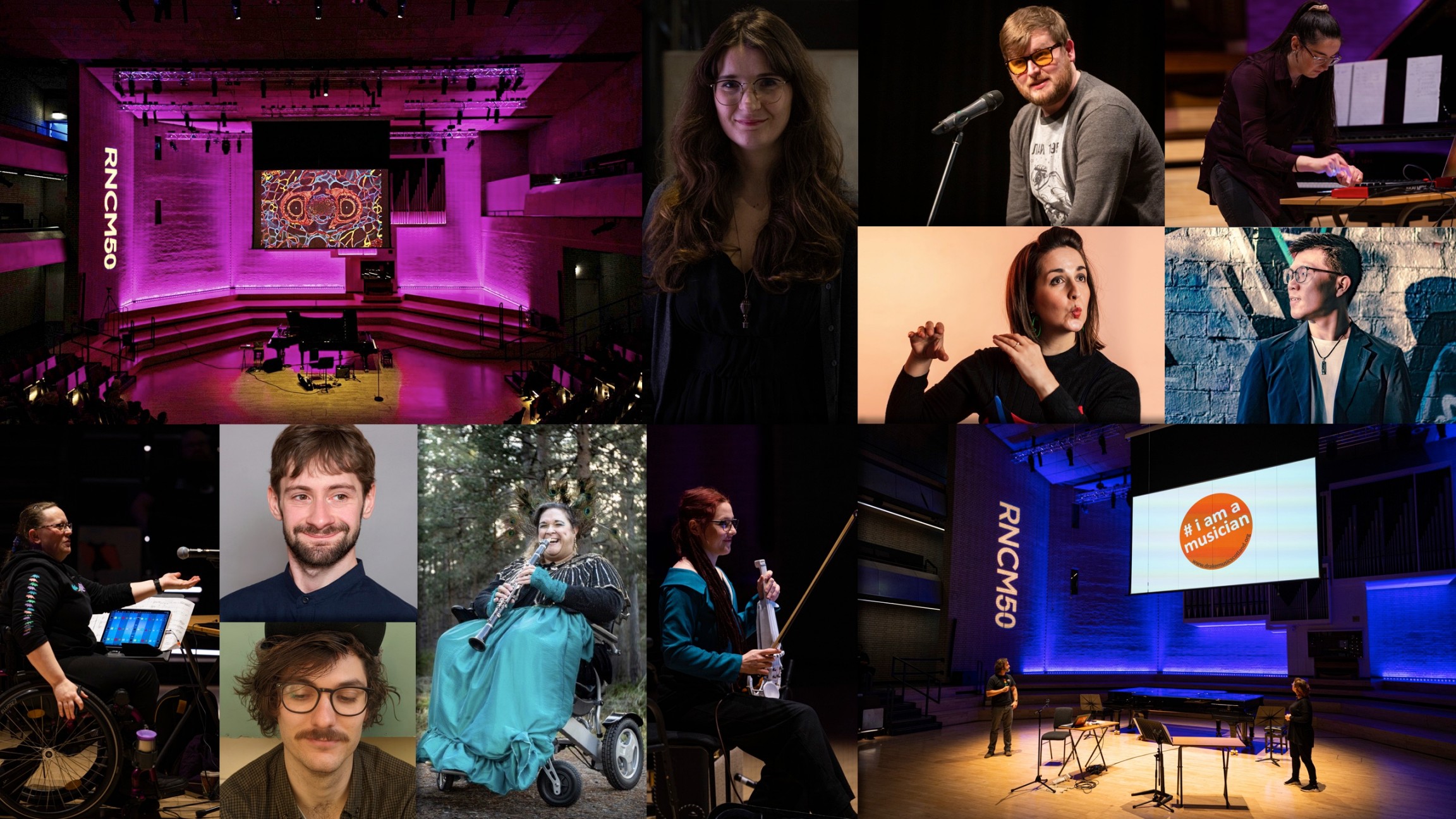
The day spotlights the work of disabled, d/Deaf and neurodivergent artists in the UK who use technology in innovative ways, and whose unique practices are driven by their differences, instead of conforming to non-disabled traditions. From Clare Johnston’s iPad to Louis Palfrey’s Makey Makey Kits and Sonia Allori’s Electronic Wind Instrument, each artist and event provides new insight into technology, music and disability.
It also features three RNCM PRiSM & Drake Music Artistic Partnerships, bringing together six multidisciplinary artists to jointly present a headline concert in the evening. More information about these partnerships can be found at:
This event is made possible by NWCDTP who are supporting Megan Steinberg’s Lucy Hale Doctoral Award, a Composition PhD in association with Drake Music exploring and widening accessibility in music. More information about the Lucy Hale Doctoral Award can be found here.
About Lucy Hale
Lucy Hale was a composer and disability advocate, who died in January 2021. Lucy was known for her innovative approach to composition and her passion for breaking down barriers. In 2021 Lucy was planning to begin her PhD at the Royal Northern College of Music, in partnership with Drake Music and PRiSM, having won Collaborative Doctoral Award funding to investigate disability and accessibility through the composition of new works for accessible musical instruments. This research continues in her name, now carried out by Megan Steinberg, who will be showcasing some of her work at this celebration of Lucy’s life.
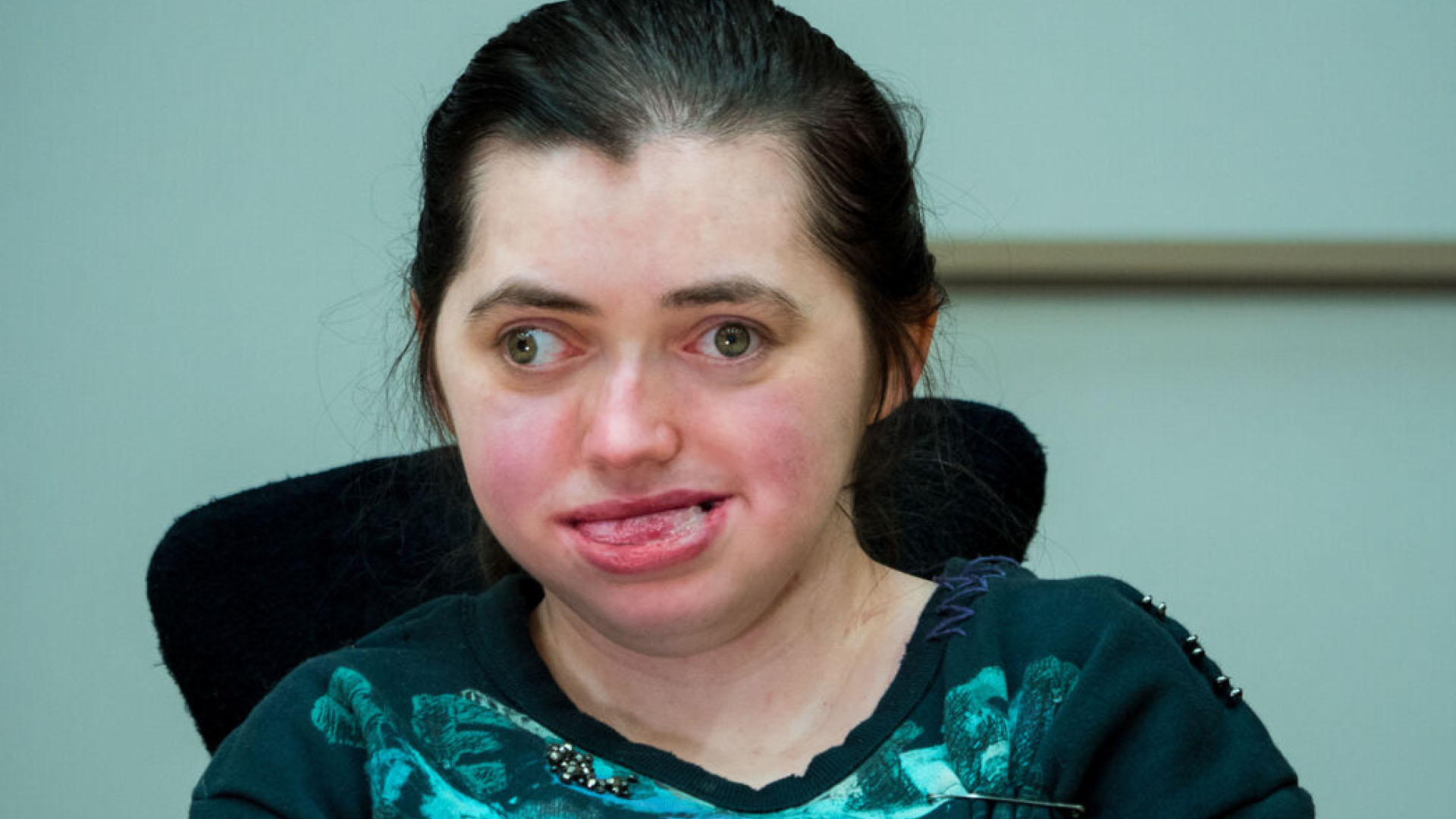
Schedule
11.30am – 12pm / Carole Nash Recital Room
Welcome
12pm – 1pm / Carole Nash Recital Room
Workshop with Louis Palfrey
2pm – 3pm / RNCM Concert Hall
Drake Music Scotland presents: Digital Orchestra
3.15pm – 4.15pm / Carole Nash Recital Room
Megan Steinberg presents: Putting Accessibility at the Start of the Creative Process
4.30pm – 5.30pm / RNCM Concert Hall
Workshop & Performance led by Clare Johnston
5.45pm – 6.15pm / Carole Nash Recital Room
Film Screening – Forward: This is happening + Q&A
8pm – 9pm / RNCM Concert Hall
Evening Concert: RNCN PRiSM & Drake Music Artistic Partnerships (Sarah Fisher & Bofan Ma | Oliver Vibrans & Tilly Chester | Megan Steinberg, Kathryn Williams & Sonia Allori)
Tickets:
Day ticket (access to all events throughout the day, including the Evening Concert):
Free admission, ticket required (limited availability)
Evening Concert ticket only
Free admission, ticket required
Programmes
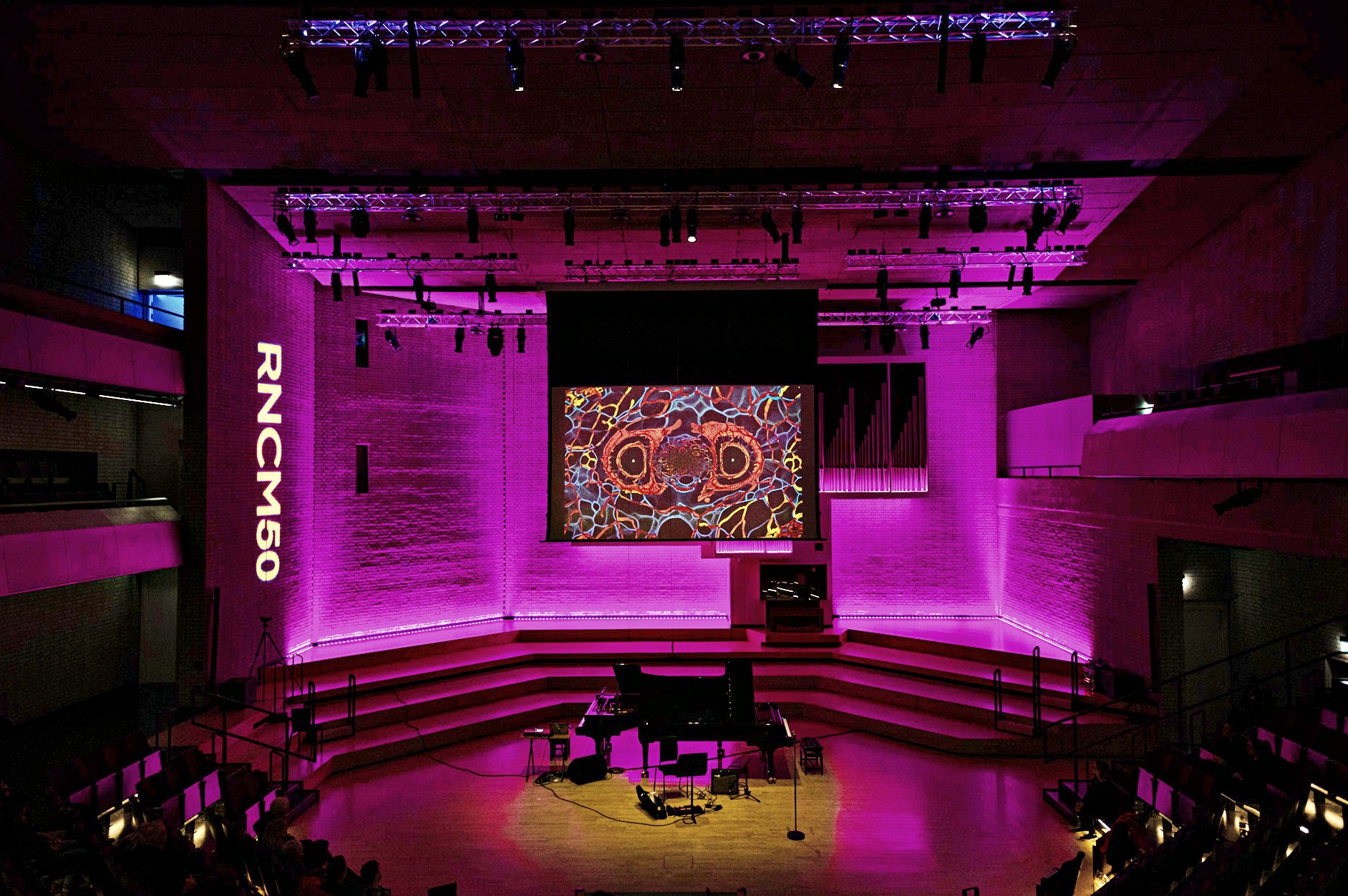
Photo credit: Roscoe Rutter
Lucy Hale Day of Music, Disability and Technology: Day Events
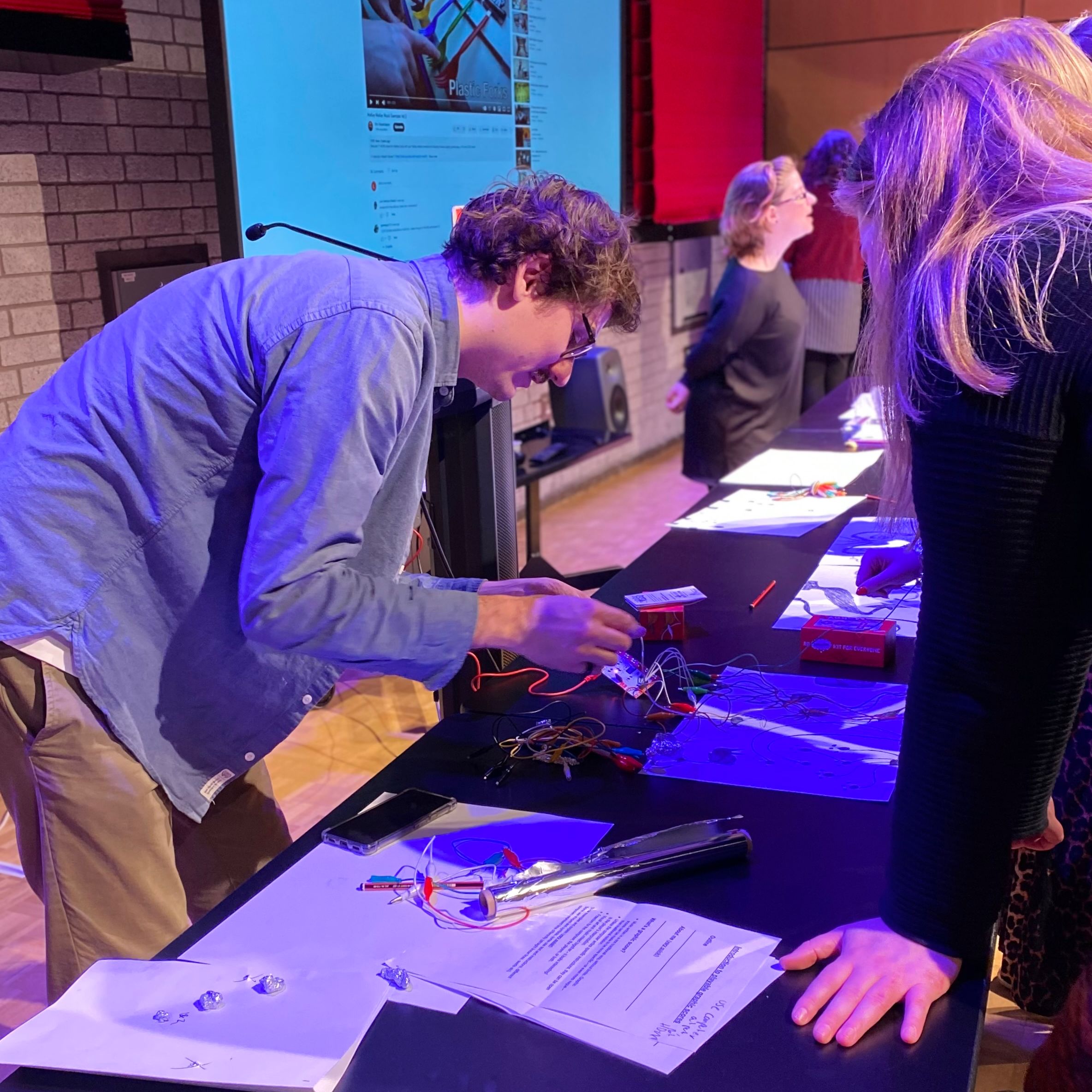
11.30am – 12pm / Carole Nash Recital Room
Welcome
12pm – 1pm / Carole Nash Recital Room
Workshop with Louis Palfrey
Louis Palfrey is an award-winning Autistic composer, producer and educator based in Margate who works with music technology to create distinct sound worlds that tell a story. Louis will run a workshop on using simple graphic notation and conductive interfaces to create a playable graphic score.
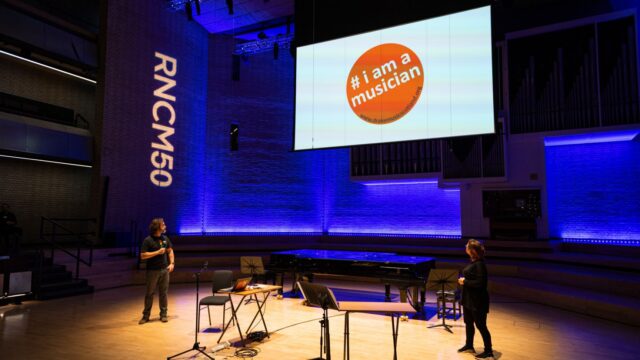
Photo credit: Roscoe Rutter
2pm – 3pm / RNCM Concert Hall
Drake Music Scotland presents: Digital Orchestra
This session will explore the 10-year evolution of Digital Orchestra from a 2012 New Music Collaboration in London to what exists today: a busy and varied programme of artist support tailored to individual ambitions. We will share films and images from recent performances including Diversions and Echoes Concerts, Devised & curated by Ben Lunn.
3.15pm – 4.15pm / Carole Nash Recital Room
Megan Steinberg presents: Putting Accessibility at the Start of the Creative Process
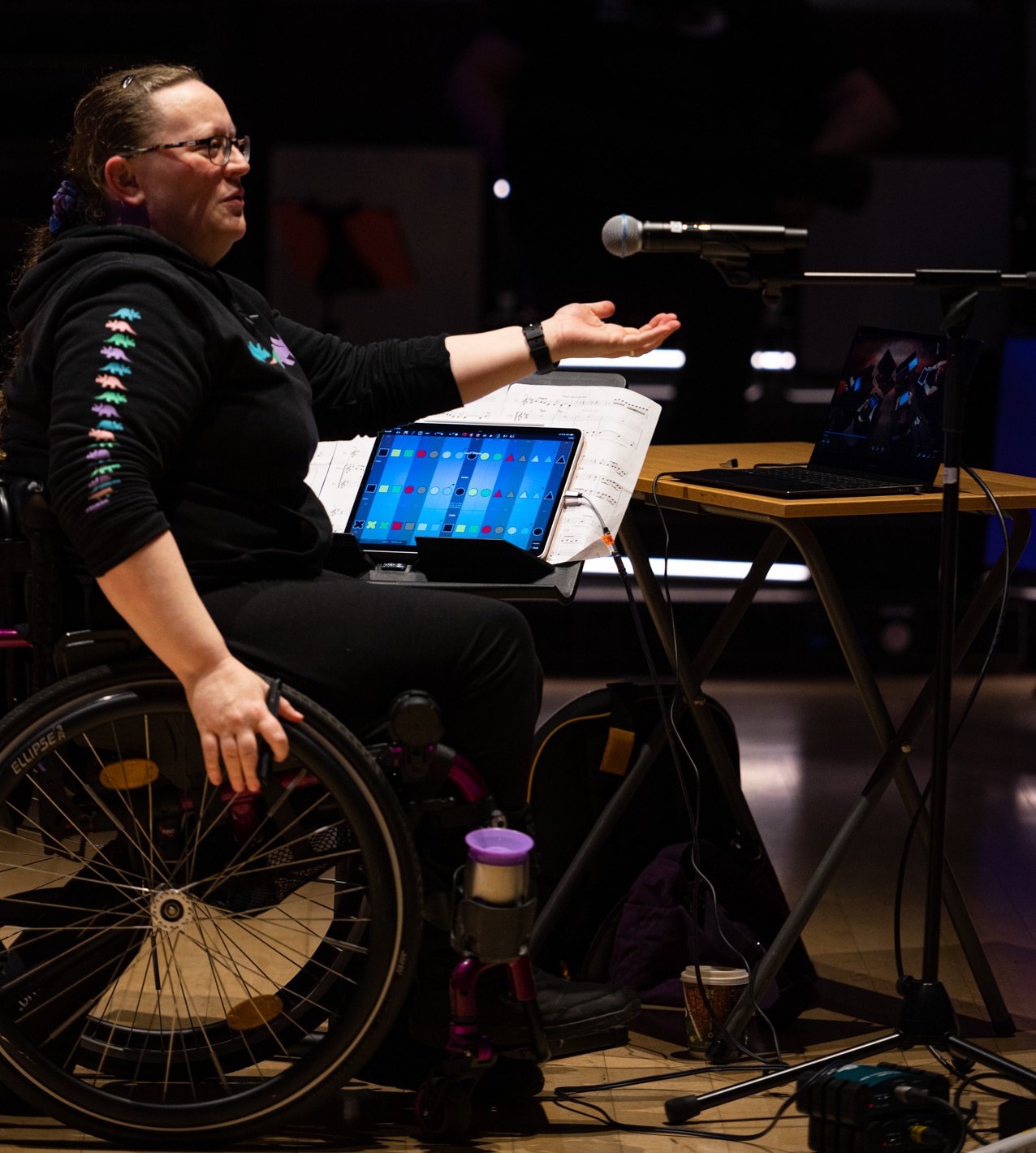
Photo credit: Roscoe Rutter
4.30pm – 5.30pm / RNCM Concert Hall
Workshop & Performance led by Clare Johnston
Clare Johnston is a disabled-identifying performer, composer, teacher, and music technology experimenter. As an Associate Musician with Drake Music Scotland, Clare writes mostly for iPad using the ThumbJam app, performing her own compositions. Her performances involve a wide variety of technology instruments used by Drake Music Scotland to make music performances accessible.
5.45pm – 6.15pm / Carole Nash Recital Room
Film Screening – Forward: This is happening + Q&A
This short film, by Zakiya Leeming (PRiSM Artist and Producer in Residence), documents the process of making Megan Steinberg’s new piece This is happening, which premières in the evening concert. Working with flautist Kathryn Williams and EWI performer Sonia Allori, the three musicians figure out how to make the composition process accessible.
Lucy Hale Day of Music, Disability and Technology: Evening Concert
8pm – 9pm / RNCM Concert Hall
Evening Concert: RNCN PRiSM & Drake Music Artistic Partnerships (Sarah Fisher & Bofan Ma | Oliver Vibrans & Tilly Chester | Megan Steinberg, Kathryn Williams & Sonia Allori)
The day culminates in a concert of world premières from artistic partnerships between PRiSM and Drake Music.
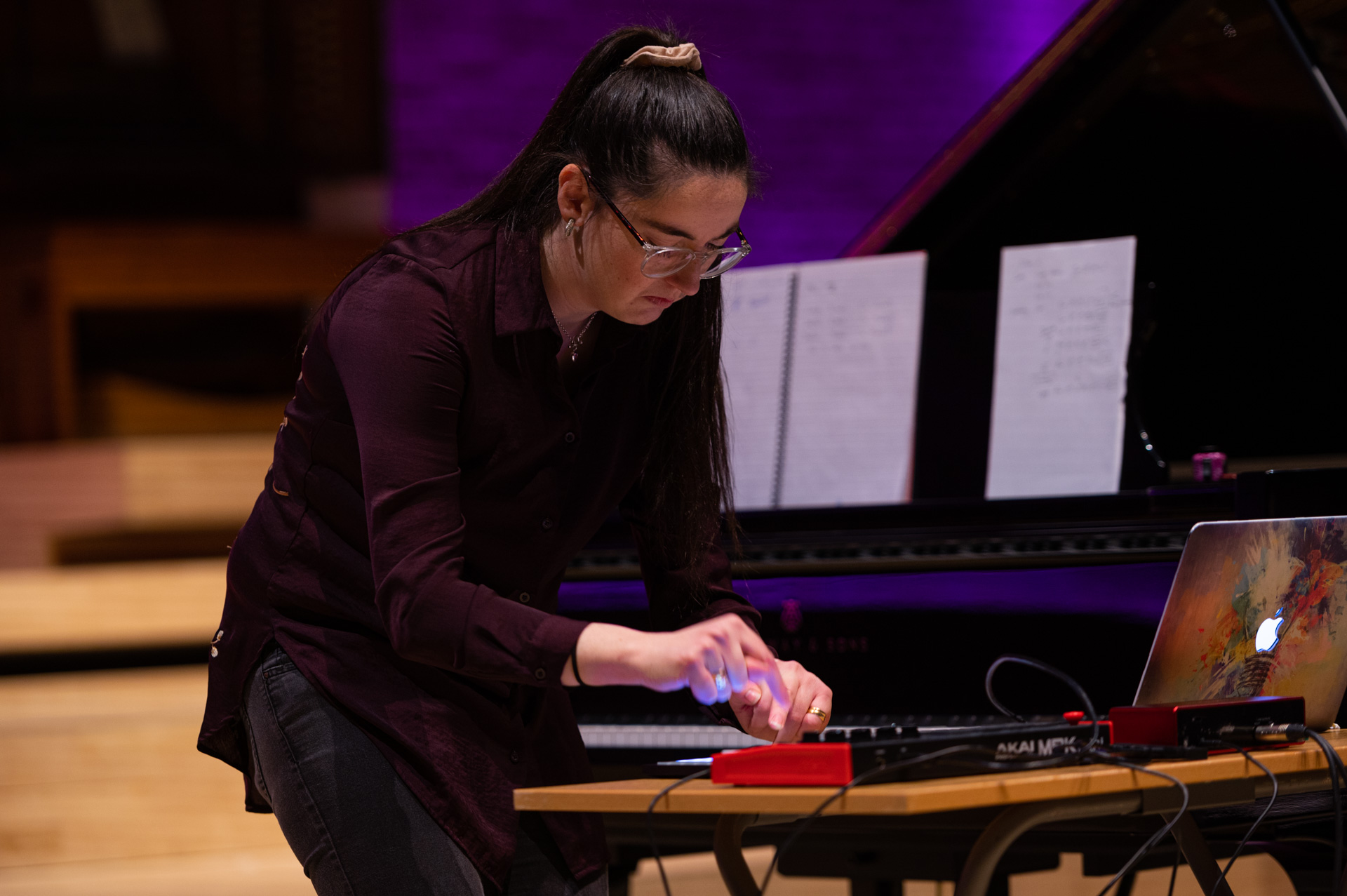
Photo credit: Roscoe Rutter
Details:
Sarah Fisher Don’t fade away (2019)
Sarah Fisher & Bofan Ma Mysteries of my mind (world première)
Bofan Ma piano
Sarah Fisher piano/electronics/finger drums
The performance opens with Don’t fade away (2019), which was composed for and dedicated to Sarah’s mother who has been fighting Dementia and Parkinson’s Disease in recent years.
Sarah & Bofan will then present their joint composition entitled Mysteries of my mind, mixing up sounds of the piano and drums – the two groups of instruments that Sarah is most passionate about, as well as incorporating technology to develop something new, unlocking new ideas and mysteries.
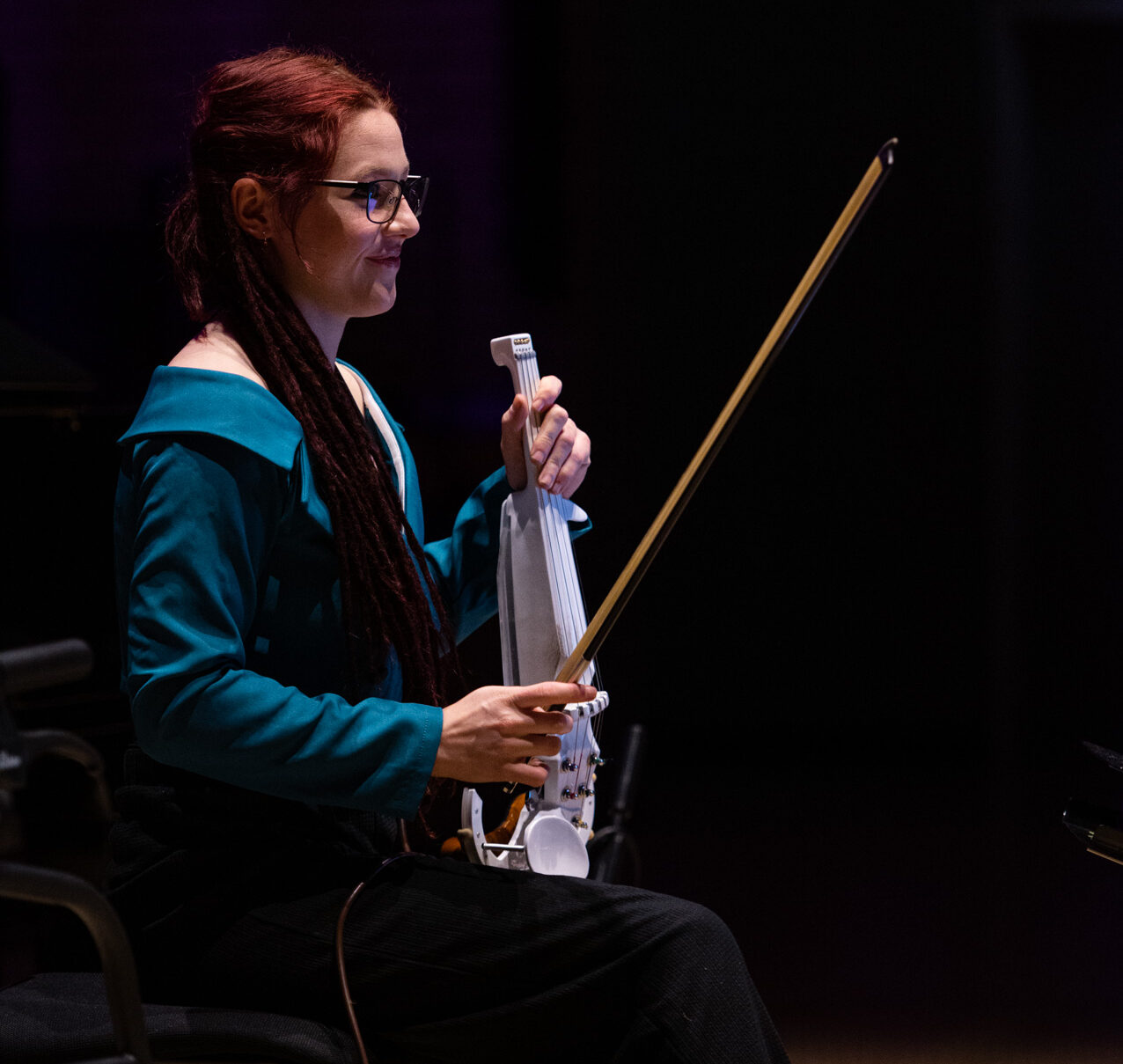
Photo credit: Roscoe Rutter
Oliver Vibrans Hatchet Job (world première)
Tilly Chester viola
Hatchet Job blends contemporary classical techniques with sludge rock and noise art to expand the pallet of solo instrumental performance and reimagines the form for the modern day. Both performer and composer have extensive experience with electronic music making, which they are combining in a collaborative, iterative process to bring the work to life.
Hatchet Job will take the form of a series of short etudes for viola, exploring the new frontiers of playing techniques, with the inclusion of effects and amplifiers into the signal chain. From the use of guitar picks to polyphonic delays that elongate phrases, which overlap one to the next. The primary sound is that of a driven guitar amp, which drastically affects how the instrument responds to different bowings and playing styles, impacting how the player approaches the performance. The piece explores how this haptic feedback influences how the instrument is written for and strives to open up new avenues in solo instrumental writing.

Photo credit: Roscoe Rutter
Megan Steinberg This is happening (world première)
Kathryn Williams flute
Sonia Allori electronic wind instrument (EWI)
In Megan’s own words:
“Both performers have long-term health conditions that they are interested in exploring through music, and I took the opportunity to explore my psychosis through sound. This is happening consists of a text-graphic score for flute with a pitch set and creative captions for EWI. The text-graphic score represents my auditory hallucinations, Kathryn recorded this part and we sent it to Sonia and a creative captioner, Karen Pritchard. Sonia then received the creative captions, which eloquently describe Kathryn’s recording of the score, and recorded a response, which was then arranged with the flute.
This is happening acts as a sort of game of Telephone: I describe sounds to Kathryn -> Kathryn interprets these sounds on the flute -> Karen interprets these sounds in text -> Sonia interprets the text on the EWI. Each layer of interpretation is valid and represents a different reality. Each person brings their own experiences to the piece and performs based on their abilities.”
Lucy Hale Day of Music, Disability and Technology: Installation at RNCM Café
Installation at RNCM Café / All-day
Brain Space
by Rosie Woolaghan and Megan Steinberg
Digital stop motion, surround sound and tactile objects [looped]
Brain Space is an audiovisual assimilation of perceptual differences. This results in experiencing
shifts in reality, and multiple versions of reality. Both artists experience visual disturbances, Megan
(composer) also experiences auditory hallucinations. The piece combines projected digital stop
motion animation of abstract shapes, by Rosie (animator), and sonic art abstract noise, by Megan.
The animated visuals are projected onto physical realisations of the visual disturbances
experienced by the artists. This is combined with audio that is a sonic manifestation of Megan’s
auditory hallucinations. Brain Space breaks up the depth of field of the surrounding environment,
in order to layer reality and non-reality.
Documentations | PRiSM & Drake Music Artistic Partnerships
Megan Steinberg | Kathryn Williams | Sonia Allori
Oliver Vibrans | Tilly Chester
Sarah Fisher | Bofan Ma
Further Information
Artists' Biographies
Megan Steinberg
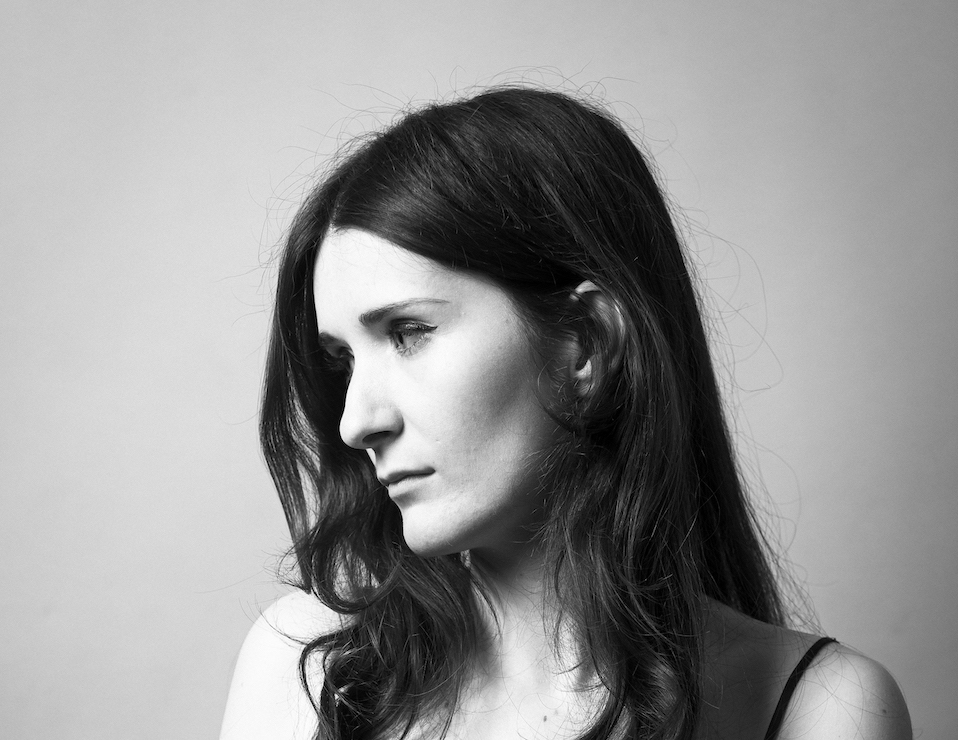
Megan Steinberg by Sam Walton samwaltonphotography.com
Megan Steinberg is an experimental composer and abstract turntablist based in London. She works with found sound, chance procedures, graphic scores, quietness and microtonality.
Fascinated by space, silence and architecture’s both direct and indirect control over sound, Megan studies instruments, spaces and objects to draw on/out their unique sound qualities.
Originally a jazz guitarist, Megan studied Composition at Brunel University where she fell into experimental music. After discovering free improv using objects, violin and cello, in 2016 she began performing free improv and experimental music for single-deck, analogue turntable.
As a free improv abstract turntablist, Megan is interested in furthering the repertoire and exploring performance techniques for the instrument. In 2018 she embarked on a Finnish tour with solo turntable material, and has performed with other musicians including Elliot Galvin, Benedict Taylor and Jenn Kirby.
Megan is studying a PhD at Royal Northern College of Music, where she has been appointed the Lucy Hale Doctoral Composer in Association with Drake Music, from 2021. Her project is focused on the creation of works for Disabled musicians, new instruments and AI, placing accessibility at the beginning of the compositional process.
Her music has been performed most recently at Kings Place, Grachtenfestival in Amsterdam, Arts by the Sea Festival in Bournemouth and IKLECTIK. Her music has also been broadcast on Resonance FM and BBC Radio 3.
In 2016 Megan was awarded the F I Williams Prize for Composition for her piece The Dying Sakura Tree, performed by Distractfold.
In 2017 she took part in the BBC Proms Inspire project for International Women’s Day at Maida Vale Studios with other young, female composers and Hannah Kendall. She was Artist in Residence at the Picture Gallery, Royal Holloway in 2017, and Huddersfield Contemporary Music Festival in collaboration with the Australian Art Orchestra in 2022.
Megan has an MMus in Advanced Musical Studies from Royal Holloway University and BMus Composition from Brunel University. She is incredibly proud to have studied with: Colin Riley, Christopher Fox, Jennifer Walshe and Mark Bowden.
In 2018, Megan founded and curated Soundling Festival for International Women’s Day in London. In 2023, she will curate the Lucy Hale Music & Disability Festival in Manchester.
She is a committed advocate for equality and diversity in new and Classical music, and accessibility of live music.
Louis Palfrey
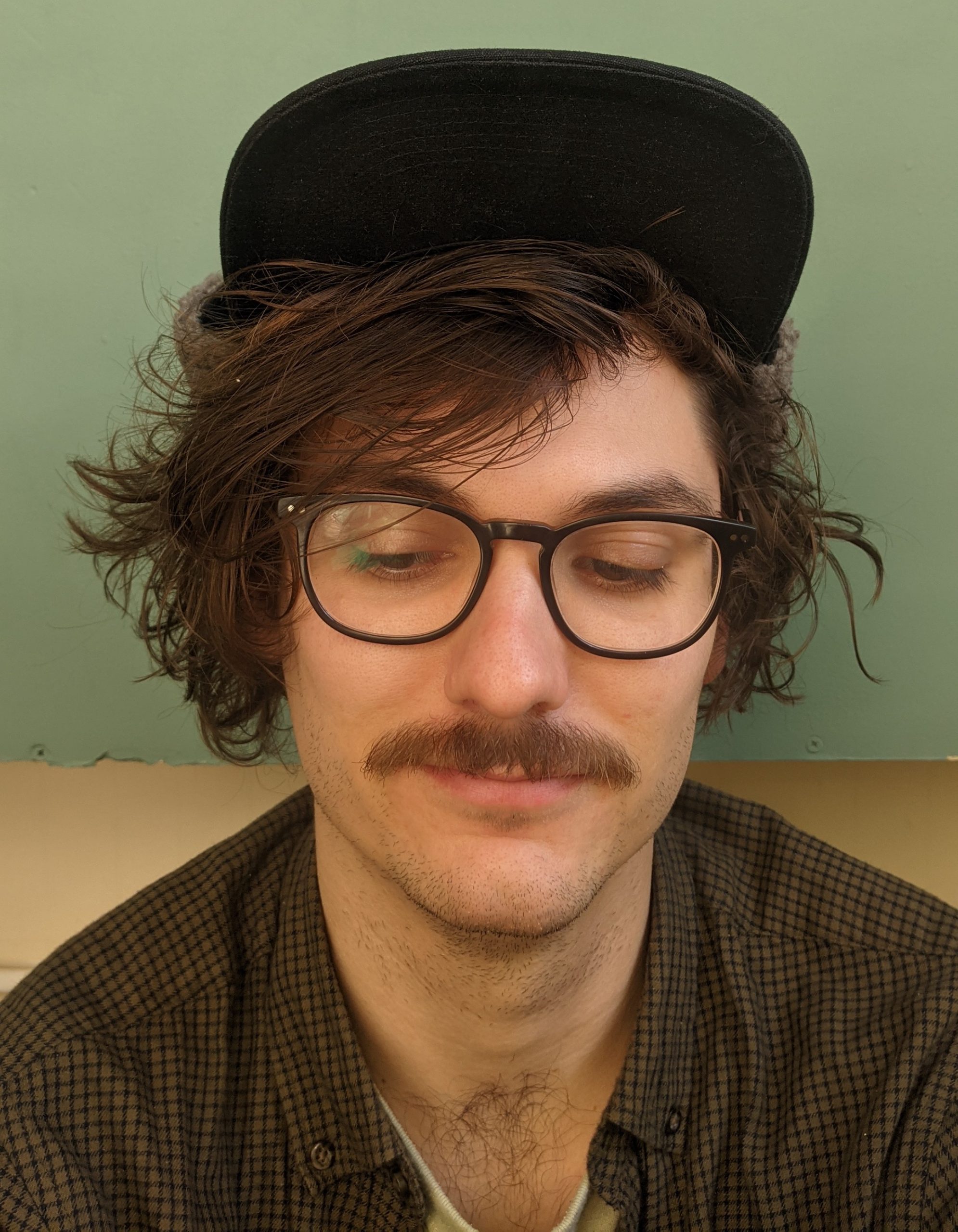 “I’ve been experimenting with music and sound for as long as I, or anyone else in my life, can remember.
“I’ve been experimenting with music and sound for as long as I, or anyone else in my life, can remember.
My Grandparents often like to remind me of how I would bash away at the keys of my small Casio keyboard for hours on end, before I was even able to string a full sentence together.
I remember sitting in my living room as a toddler, recording my own radio talk shows on a Fisher Price tape recorder—humming the theme tunes and playing the parts of both host and guests—before I could even tie my own shoelaces.
I recall receiving my first (child-size) electric guitar on my fifth birthday, and being more interested in how it was put together and the strange sounds it could produce than learning how to play it ‘properly’—which inevitably led to it falling into disrepair relatively quickly, and myself not touching a (6 string) guitar again for another ten or so years.
I spent my early teenage years playing bass in terrible punk bands. We performed in a local talent show once and came dead last.
At fifteen years old I received my first laptop and MIDI keyboard, and my household was connected to the internet for the first time. My eyes were opened to the compositional possibilities offered by music technology.
I’ve spent the fifteen years since then further exploring and pushing myself—experimenting with all manner of styles, techniques and genres.
Sound was my first friend—my best friend—and we still play together to this day.” – Louis Palfrey
Ben Lunn
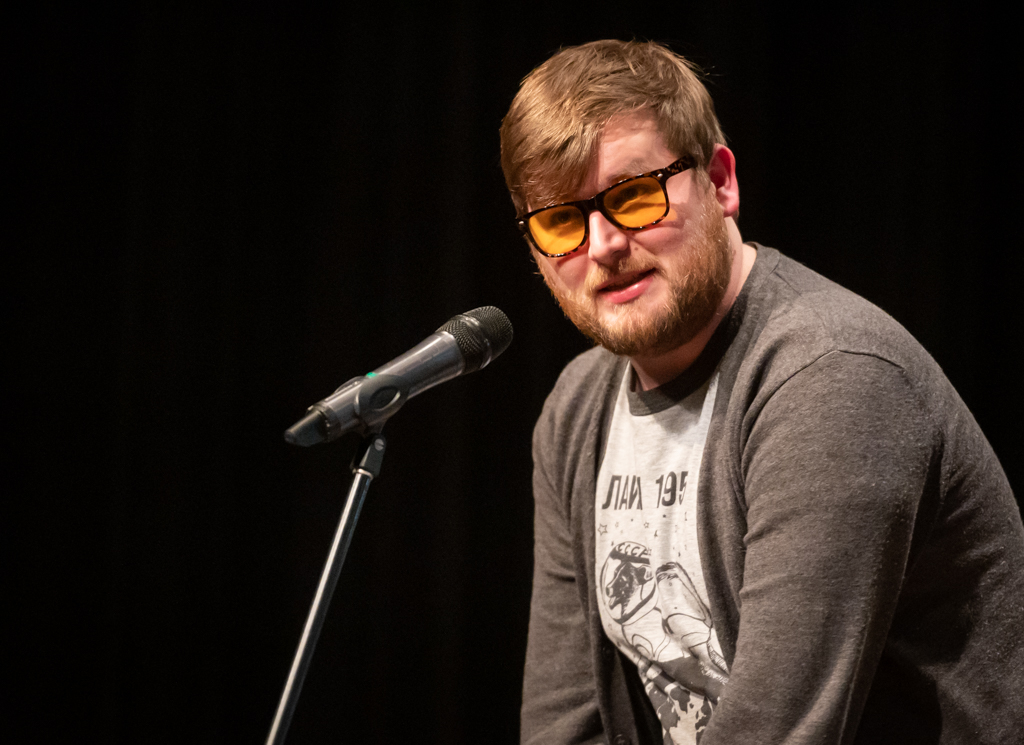 His music has been described as ‘Evocative’ – Buzz Magazine, ‘Restrained Otherworldliness’ – P.G. MusicWeb International ‘Chilling’ – Theatre Wales or ‘produces…glorious roaring sounds’ and ‘desolate monotone’. He has also been referred to as a ‘Composer of life music’ – M.K.
His music has been described as ‘Evocative’ – Buzz Magazine, ‘Restrained Otherworldliness’ – P.G. MusicWeb International ‘Chilling’ – Theatre Wales or ‘produces…glorious roaring sounds’ and ‘desolate monotone’. He has also been referred to as a ‘Composer of life music’ – M.K.
His music, as he continues to develop, is more and more retrospective often drawing more influence from the ancient. Despite being so reflective of tradition, his work always remains of the time. His contradictory influences from Buddhism and Bataille, Perotin and Radulescu, Part and Harvey continue to hold him on the precipice of the now and the past.
Ben Lunn is a Makem composer. He has studied at the Royal Welsh College of Music and Drama under the guidance of Peter Reynolds, where he was awarded the RWCMD Composition Prize upon graduation. Currently he is studying in the Lithuanian Academy of Music and Theatre under the guidance of Marius Baranauskas. He has also received mentoring from Param Vir. In 2015 Ben received 3rd place in the Sofia Soloists International Competition.
His work has been performed across Europe and by varying ensembles and soloists. These have included Martynas Levickis, Rolf Hind, Livas Clarinet Quartet, Caryl Hughes, Nicolai Matsov, Sofia Soloists, Welsh Sinfonia, Gleb Pysniak, Artro Quartet, Dalia Dedinskaite, and Francoise-Green Duo.
On top of this his works have made appearances in a wide collection of festivals including Sounds New Festival (2010), The London New Wind Festival (2011,2012,2016), Second Movement’s ‘Rough for Opera’ (2012) ,Monmouth Festival (Inaugural Student Composer in Residence 2013)Leeds Lieder+ (2013), Atmospheres Festival (2014), Occupy The Pianos (2014), St. Christopher’s Festival (Vilnius 2014), Vale of Glamorgan (2015), HASS Fest (Yerevan 2016), Crossroads International Contemporary Music Festival (Salzburg 2016), and Druskomanija (2016)
Ben’s work has covered many genres and has created work for contemporary dance productions by the Striking Attitudes dance company.
Clare Johnston
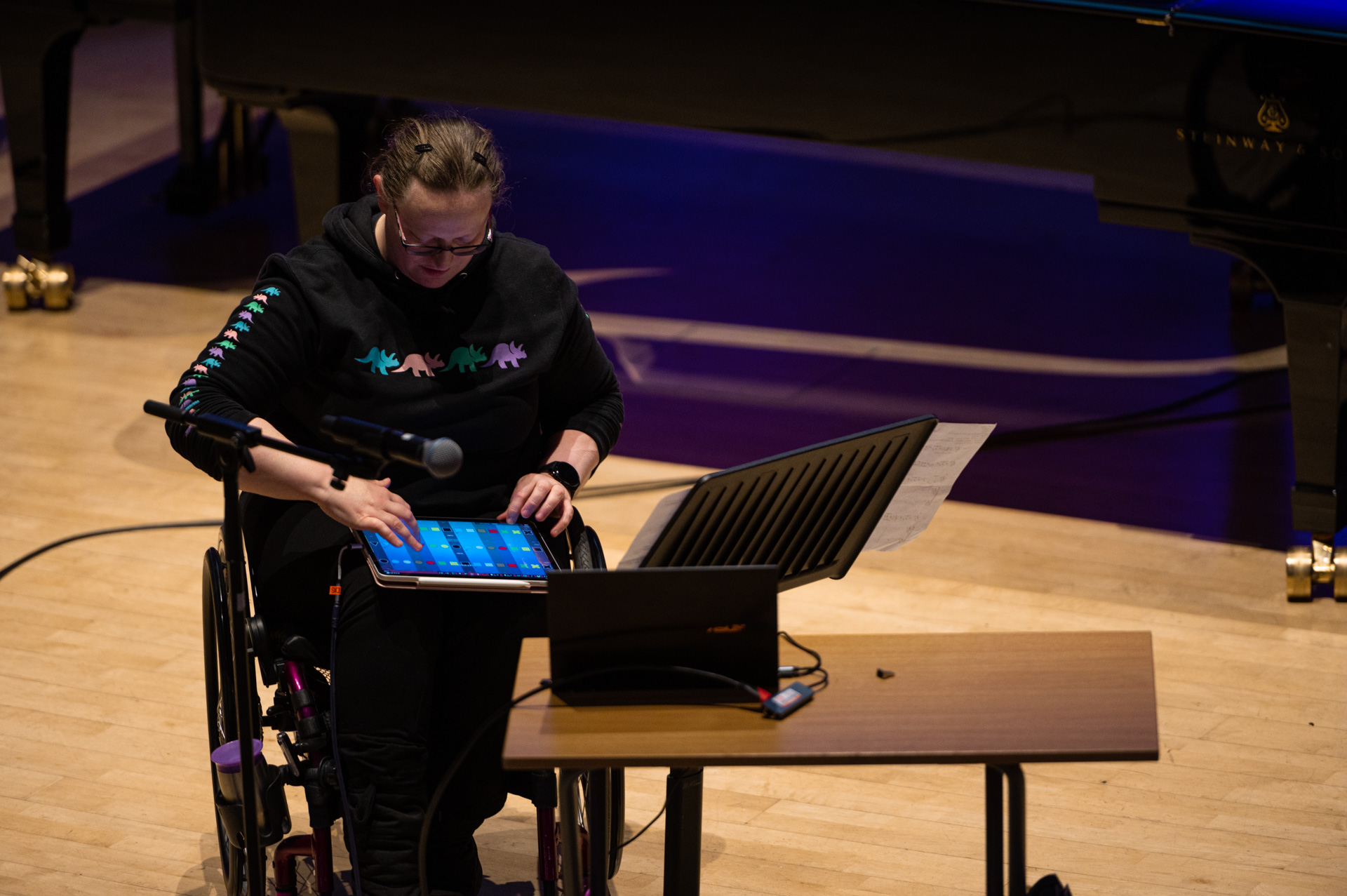
Photo credit: Roscoe Rutter
Clare Johnston is a disabled-identifying composer, performer and music technologist. She grew up in the Abled youth music sector playing viola and recorder, but faced access barriers accessing the next level of music education. After a few career changes along the way, in 2009 Clare returned to her first love of music and music education.
It is during her work with Drake Music Scotland that she started to experiment with music technology and fall in love with the possibilities offered by iPad apps to create good quality performances with a distinctly Disabled voice. Clare’s compositions include Solo a Trois for solo iPad in 3 voices, Bouncing harps for digital and Acoustic Harp duet and Contemplation and Review composed for a distant MIDI ensemble of iPad, Akai EWI, MIDI violin, synthesizer and MiMu musical gloves.
Clare feels it is important for digital instruments to have their own unique voice and compositions which have been designed for their characteristics, and compositions often explore the differences and similarities with acoustic instruments and play to the strengths of each instrument.
Sarah Fisher
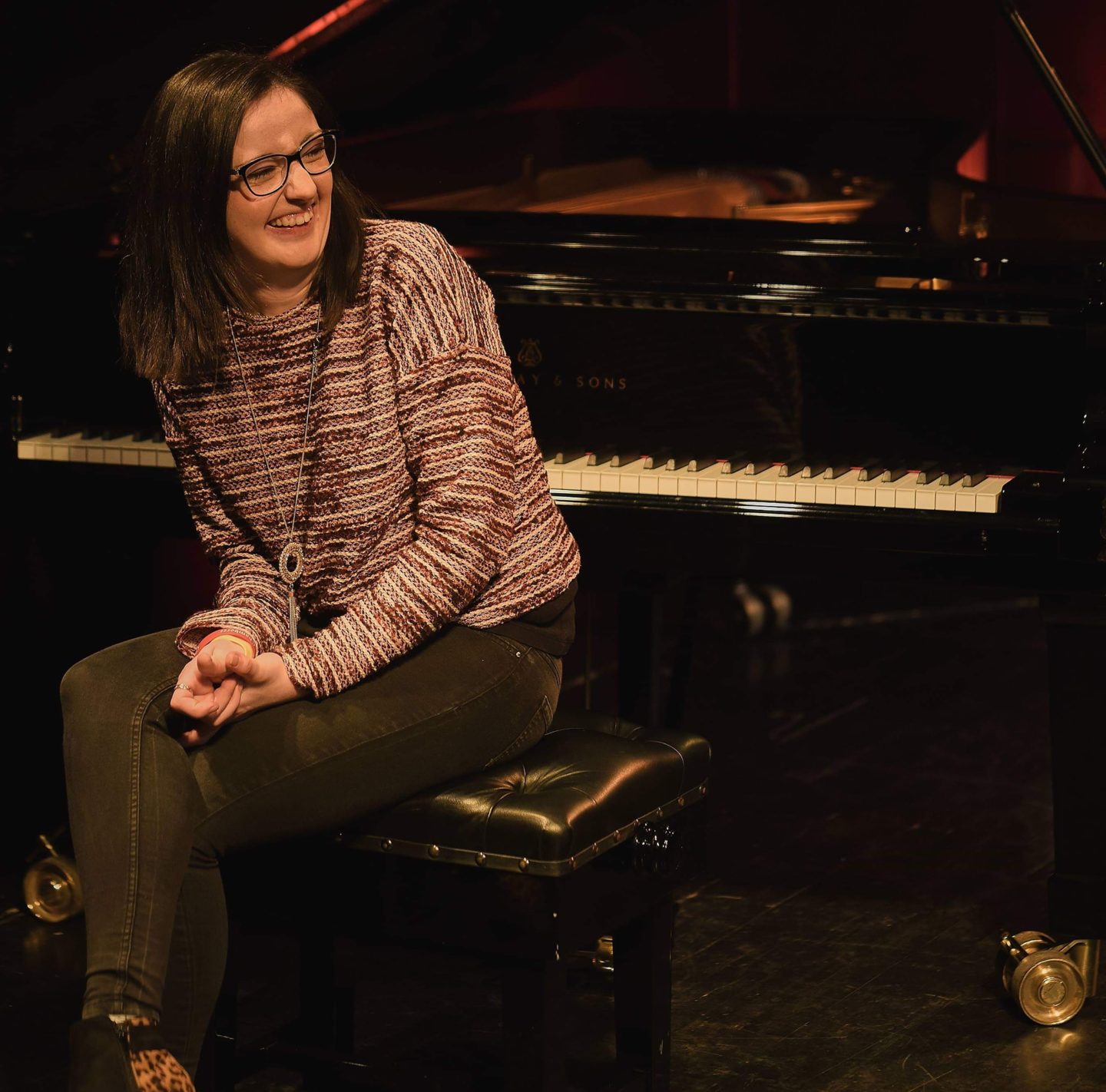 Sarah Fisher is a percussionist and pianist based in Gateshead, and a skilled community musician working in various settings. Having studied Community Music an undergraduate level through Sunderland University in 2012-2015, Sarah went on to complete her Masters in Community Music with The International Centre of Community Music at York St John University in 2018-2019.
Sarah Fisher is a percussionist and pianist based in Gateshead, and a skilled community musician working in various settings. Having studied Community Music an undergraduate level through Sunderland University in 2012-2015, Sarah went on to complete her Masters in Community Music with The International Centre of Community Music at York St John University in 2018-2019.
As a music facilitator, Sarah works with various organisations including, Drake Music, Sunderland Music Hub, Sonic Bothy, amongst many others.
Sarah has Cerebral Palsy and a hyperkinetic movement disorder which affects her upper limbs and speech. She is a keen performer and has performed at numerous events, most notably her show TWITCH. Twitch was initially funded in partnership with Sage Gateshead in 2017, before going on to receive further funding for a tour around multiple venues around the country. Twitch combined music, disability and humour to showcase Sarah’s developing artistic identity as a musician with a disability, and to break down the barriers and show you can laugh about disability.
When not performing or leading sessions as a musician, Sarah works as a visiting lecturer at various universities in the UK teaching around Community Music and Inclusion, as well as presenting research at various conferences throughout the year and part of numerous music organisation boards.
Bofan Ma
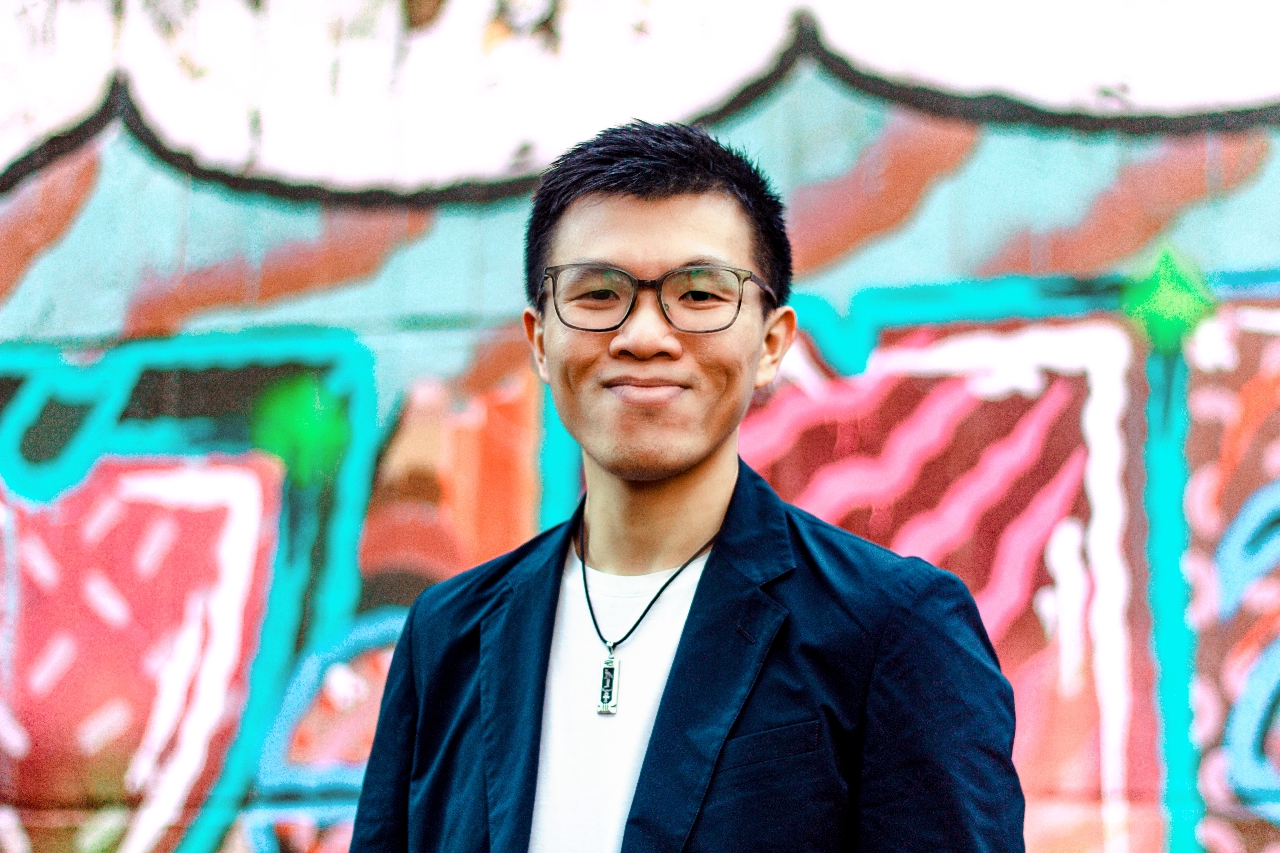
Bofan Ma (马博凡) is a composer-performer, intermedia researcher and multidisciplinary artist based in Manchester and Northwest England. Originally from China, he makes music that embodies an intricate entanglement between sound, images, performative actions, as well as a normalised, transnational artistic identity.
His work often draws on instrumental theatre, multimedia, preconditioned improvisation, and materials associated with historically and culturally-informed stereotypes. He is a keen researcher and practitioner of applied Artificial Intelligence technologies, creatively articulating a mutual, ongoing encounter between the subjective self and an increasingly problematised digital world.
Bofan has worked with ensembles/initiatives including Shanghai Conservatory Chinese Symphony Orchestra, London Sinfonietta, Psappha, Ensemble Mise-en, Ensemble X.y, Distractfold Ensemble, ANU Productions Ireland, Drake Music, Vonnegut Collective, Music Theatre Wales. His music has been heard across the globe, namely in the Shanghai Spring International Festival (China); Mise-en International Festival (USA); Hearing Art Seeing Sound International Festival (Armenia); Darmstädter Ferienkurse (Germany); The Irish Museum of Modern Art (Ireland). His work has gained international recognition in recent years, including features in the Irish Times, the New York Times, RTÉ Lyric FM (Culture File), Olympias Music Foundation (Mapping Migrant Voices), among others.
Having completed a PhD in composition at the Royal Northern College of Music in Manchester in 2021, he is currently the Post-Doctoral Research Associate at The RNCM Centre for Practice & Research in Science & Music (PRiSM), and working closely with the RNCM Experimental & Exploratory Music Research Centre (EEMRC). He is one of the founders of, and curators for the composer collective The Incógnito Project, promoting interdisciplinary collaborations and a truly diverse, unbiased artistic practice. He is also the Chair of, and one of the events/ensemble coordinators for the Manchester branch of the international network of Contemporary Music for All (CoMA), a community-based new music group with a focus on inclusivity and accessibility.
Previously Bofan studied at the Royal Academy of Music (BMus, 2011-2015), and was subsequently awarded a MMus in Composition from the RNCM in 2017. Bofan’s study in the UK over the years was generously supported by the RAM, the RNCM, the Ismena Holland Prize Foundation, the Derek Hill Trust, and the Patricia Cunliffe Composition Prize.
Oliver Vibrans
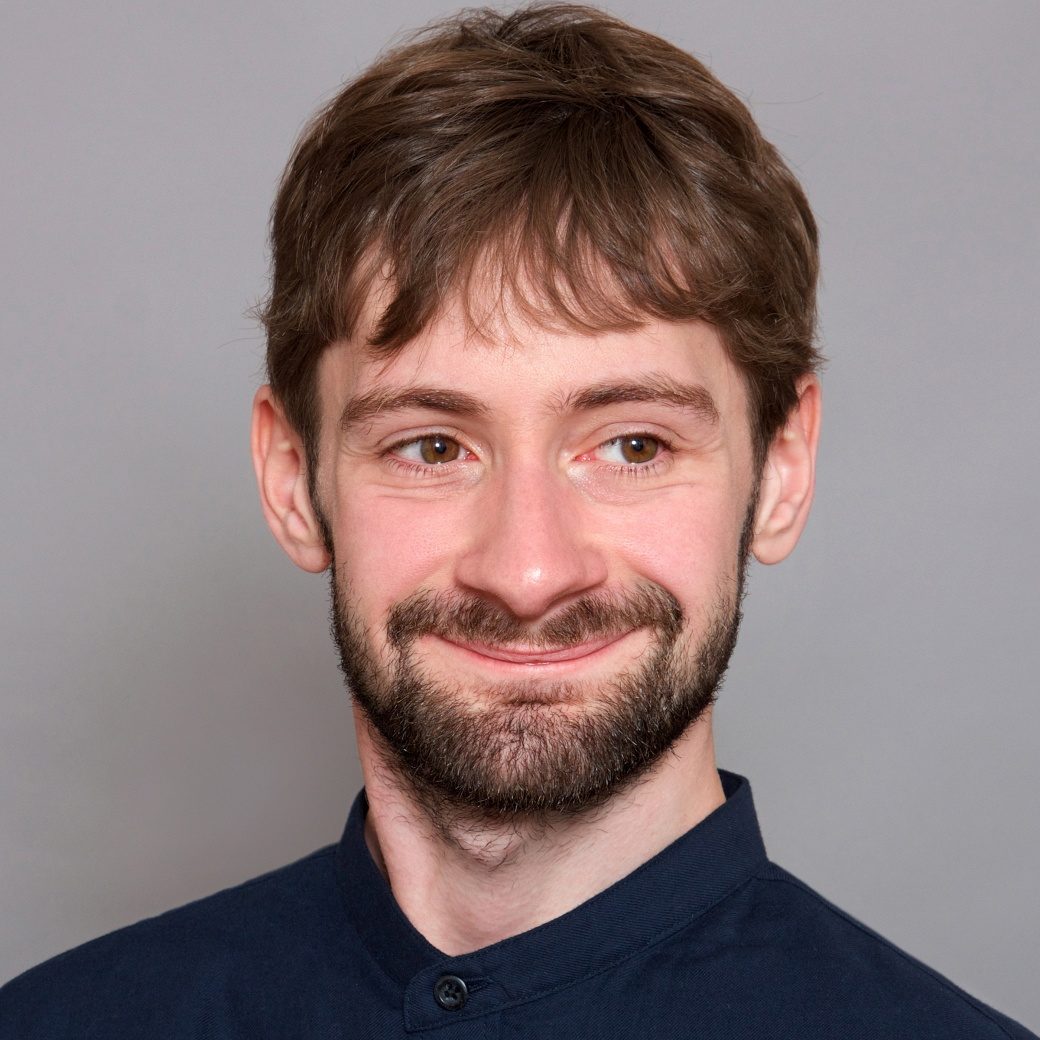 Oliver Vibrans is an Ivor Novello award winning composer and producer based in the UK working in theatre, film, radio and the concert hall.
Oliver Vibrans is an Ivor Novello award winning composer and producer based in the UK working in theatre, film, radio and the concert hall.
Recent commissions include Monomyth for the Halle; music for two episodes of Charles Hazelwood’s landmark documentary Reinventng the Orchestra for Sky Arts; Treading Water for the BBC Philharmonic for BBC Radio 3; More Up, a piece for Chamber orchestra and electronics for The Halle, BBC Philharmonic and The Able Orchestra, winner of an Ivor Novello award, and nominated for a Royal Philharmonic Society award 2020; Suspended Dance for BBC Radio 3, part of the Composers Postcard Project.
Oliver also is an advocate for disabled artists in his capacity as a board member for the Ivors Academy Trust, and on the EDI advisory board for Brighter Sound. Oliver has spoken on panels addressing the experience of disabled musicians for Orchestras Live, and at the ABO conference (Association Of British Orchestras)
Tilly Chester
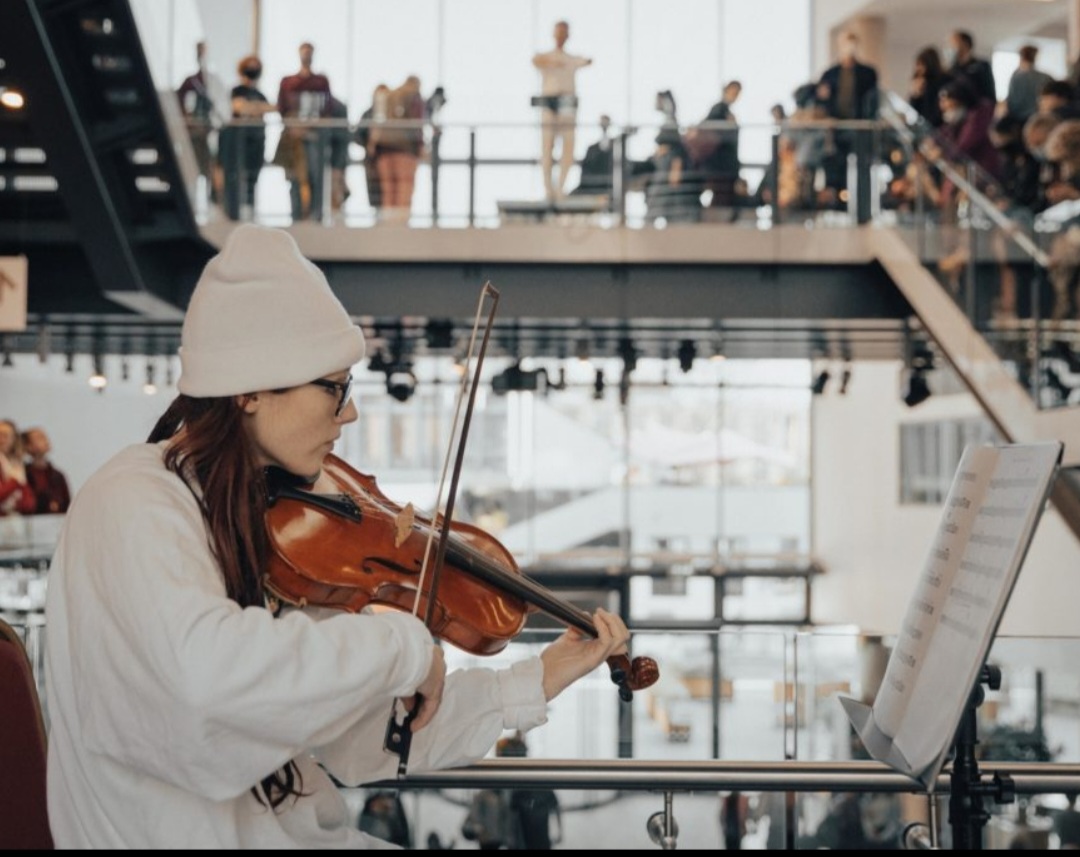 Tilly Chester has performed across the country in venues including the Royal Albert Hall, the Royal Festival Hall and Buckingham Palace. She has also performed across Europe including at the Stavros Niarchos Foundation and Cremona Concert Hall.
Tilly Chester has performed across the country in venues including the Royal Albert Hall, the Royal Festival Hall and Buckingham Palace. She has also performed across Europe including at the Stavros Niarchos Foundation and Cremona Concert Hall.
Tilly was a musician in residence with Paraorchestra in 2021-22 and has performed with them multiple times including with Coldplay at the London 2012 closing ceremony, and at Glastonbury 2019. Tilly is also a circus performer, both as a musician and as an aerialist. Tilly enjoys performing in a variety of music styles with a number of bands and DJs.
Tilly studied at Chetham’s School of Music and the Royal College of Music. She has also just completed her master’s degree in music therapy at the University of the West of England.
Kathryn Williams
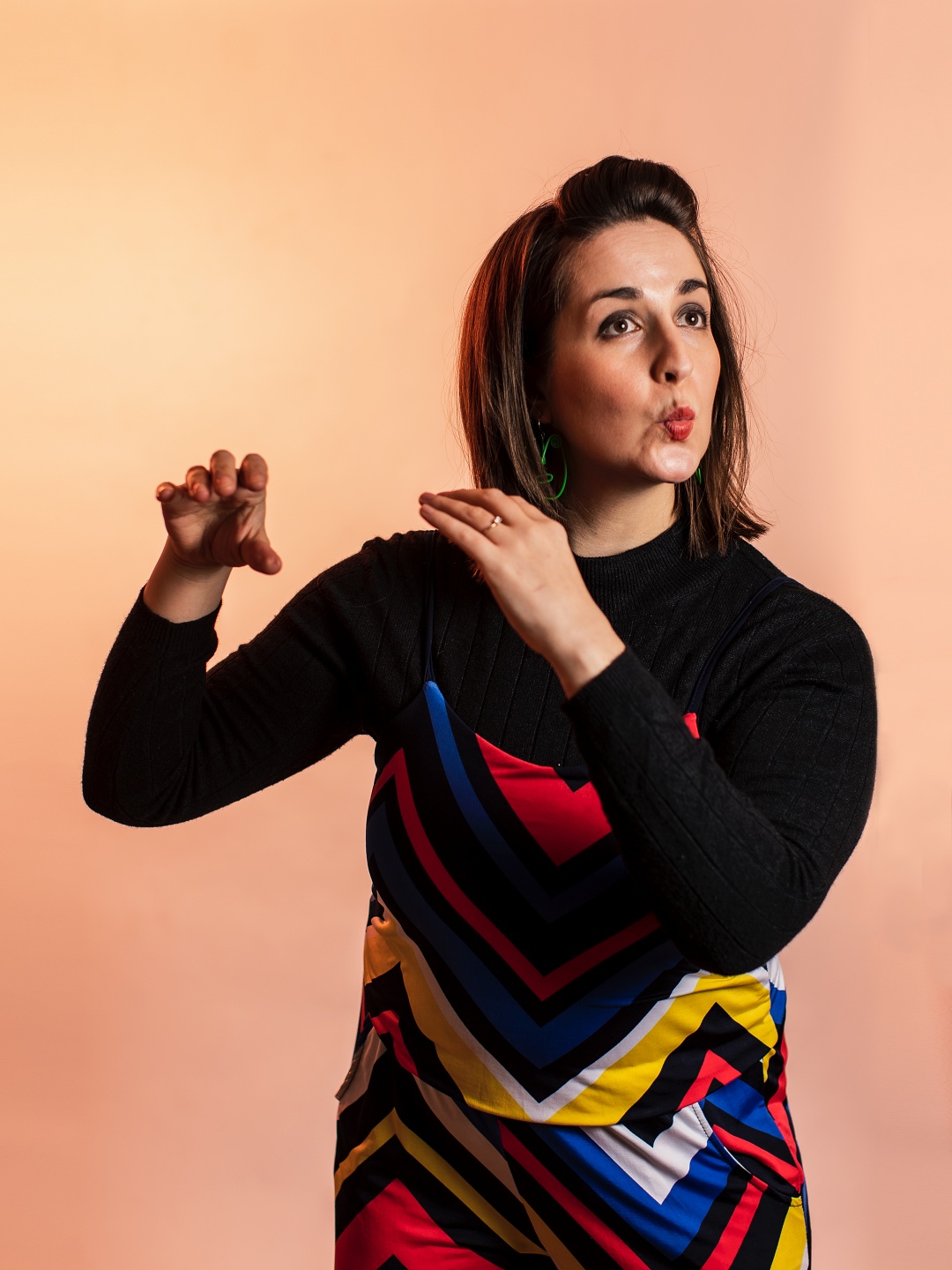 Kathryn Williams is a versatile flute soloist, orchestral player, and researcher.
Kathryn Williams is a versatile flute soloist, orchestral player, and researcher.
Her solo work has recently been focused on creatively overcoming her experiences of chronic respiratory conditions through commissioning pieces limited to a single breath for her project, Coming Up for Air. The project was released in a “strangely fascinating” (BBC Music Magazine) album in 2019 by Huddersfield Contemporary Records, performed around the world, and featured in publications such as Breathe Magazine, TEMPO, and PAN (British Flute Society).
Kathryn has recorded for All That Dust, Another Timbre, NMC, and RVNG International. In addition to performing, Kathryn works part-time as a research and policy officer in equality, diversity, and inclusion for the Independent Society of Musicians.
Sonia Allori
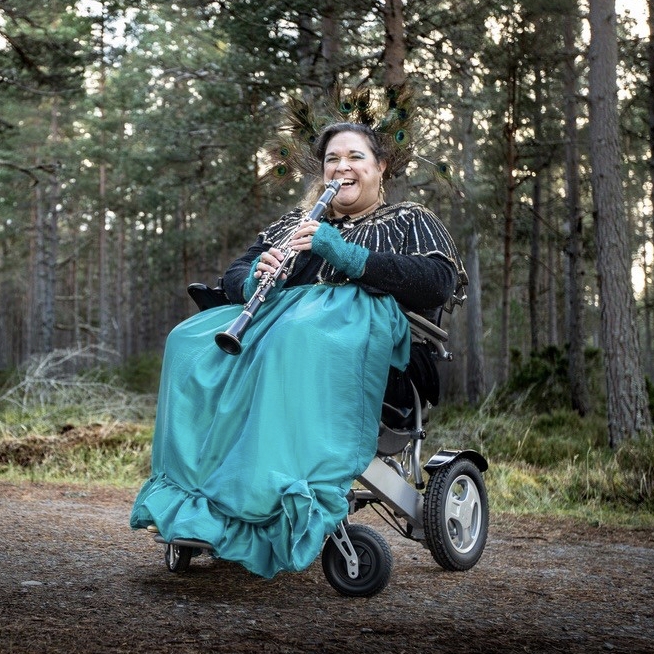 Sonia Allori is a composer, performer, researcher, and community music therapist. She completed a PhD in composition at Edinburgh Napier University which explored interactions between words and music.
Sonia Allori is a composer, performer, researcher, and community music therapist. She completed a PhD in composition at Edinburgh Napier University which explored interactions between words and music.
She is currently Artist with The Sensory Collective – Independent Arts Projects (2021-23), Development Artist with Sonic Bothy (from 2019) and recently selected for Sound and Music – New Voices cohort 2022. Sonia performed in sensory theatre production Sound Symphony (Oily Cart/ Independent Arts Projects) which toured the UK in Spring/Summer 2022. Recent works are: Room to breathe (Drake Music Scotland, 2022) which opened Sound Festival 2022 – for iPad ensemble, electronic wind instrument, wind trio, spoken voice and prepared tracks; Spider(Drake Music Scotland, 2022) performed at Queens Hall, Edinburgh – for Digital ensemble and narrator; F-email (Angel Field Festival, 2021) for alto flute, bass clarinet and vocal track; “Songs in isolation” (Disability Arts Online, 2021); “Curious-er” (Drake Music, 2020) for electronic wind instrument shortlisted for a Scottish New Music Award 2021.
Sonia is researching D/deaf performance at the Royal Conservatoire of Scotland.
Zakiya Leeming
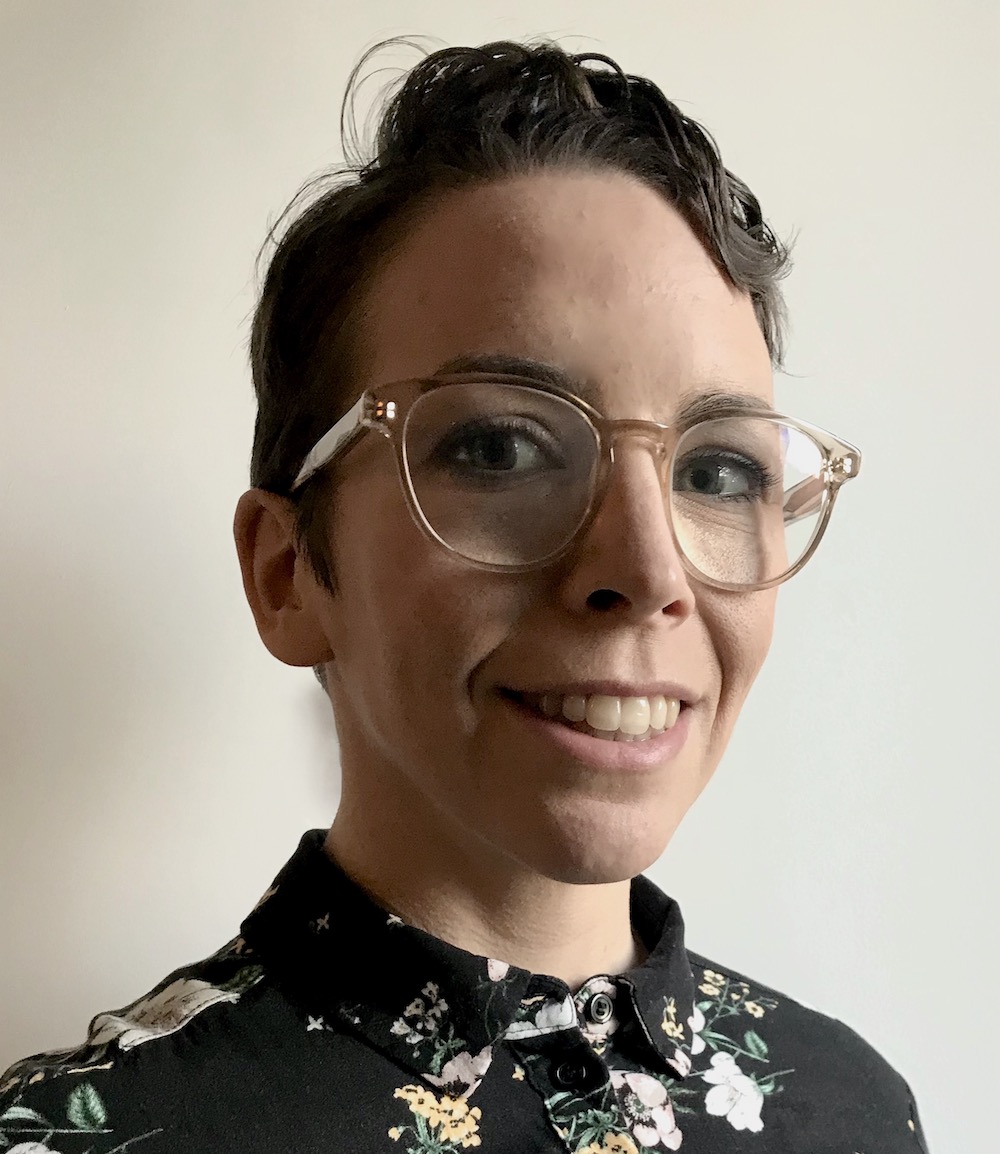
Manchester-based composer Zakiya Leeming is currently Artist and Producer in Residence at the Royal Northern College of Music’s Centre for Practice & Research in Science & Music (PRiSM). Leeming is currently working with Oxford University Professor Paul Klenerman on a project exploring interactions between immune memory and music, funded by the Wellcome Trust.
The composer frequently engages in interdisciplinary collaborations and has devised and directed a number of projects with health data scientists and doctors including Dawn, on the Morning After the Storm for members of ISARIC4C, an international consortium of researchers and doctors whose outputs informed the UK government on COVID-19. In 2019, Leeming created #MusicSaysDataSavesLives with Connected Health Cities (CHC), pairing four composers with health data scientists in a sold-out concert at the Manchester Museum. Recent commissions include Riot Ensemble, Ensemble Recherche, Future Music Festival, Explore Ensemble and Psappha.
In her undergraduate degree at the University of Tasmania, Leeming received the Examiner Newspaper Scholarship and Dean’s award for Excellence with Honours, and was awarded the Soroptimists International Manchester Award in Composition, The Edward Hecht Prize and a Gold Medal in composition at the Royal Northern College of Music. Leeming is founding co-director of experimental composer collective Incógnito and member of Machine Learning for Music working group MLM4M. Leeming was selected for the Royal Philharmonic Society’s Composer Programme 2021-22 and her work has been featured by The Guardian and BBC Radio 4.
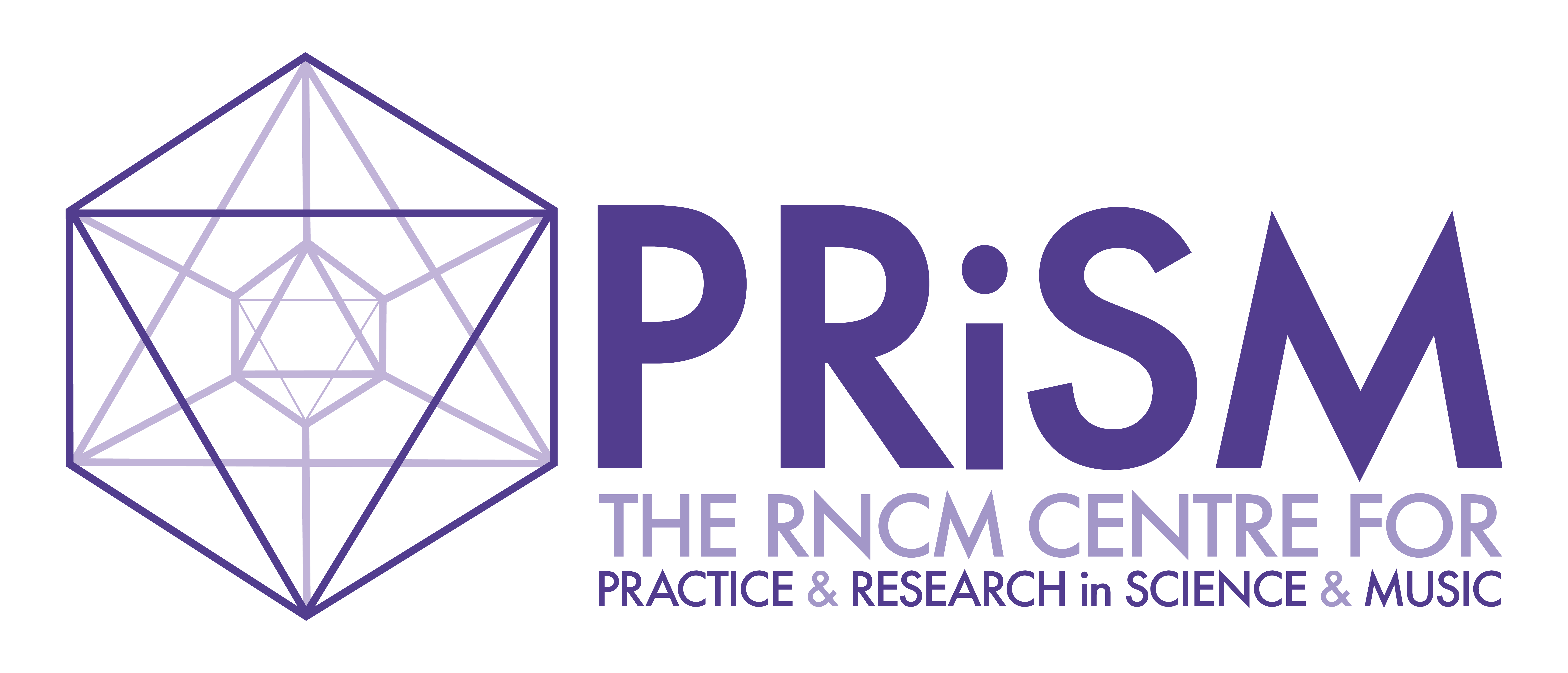 PRiSM is the RNCM Centre for Practice & Research in Science & Music. Uniquely positioned within a music conservatoire environment, the centre brings internationally leading artists and researchers together with undergraduate and postgraduate students across many fields, creating opportunities suited to all levels of interest and experience. This dynamic programme has led to international recognition for PRiSM’s work across our four emerging research areas: Music & Maths; Music & Artificial Intelligence (AI); Music & Wellbeing; Music & Environment, as well as our annual Future Music Festival, featured by the BBC, The Guardian, New York Times and more.
PRiSM is the RNCM Centre for Practice & Research in Science & Music. Uniquely positioned within a music conservatoire environment, the centre brings internationally leading artists and researchers together with undergraduate and postgraduate students across many fields, creating opportunities suited to all levels of interest and experience. This dynamic programme has led to international recognition for PRiSM’s work across our four emerging research areas: Music & Maths; Music & Artificial Intelligence (AI); Music & Wellbeing; Music & Environment, as well as our annual Future Music Festival, featured by the BBC, The Guardian, New York Times and more.
PRiSM is committed to making a real contribution to society, from developing new digital technology and creative practice, to amplifying the voices of thinkers and practitioners of marginalised demographics, and addressing fundamental questions about what it means to be human and creative today.
PRiSM is supported by the Research England Expanding Excellence in England (E3). Read more about PRiSM here.
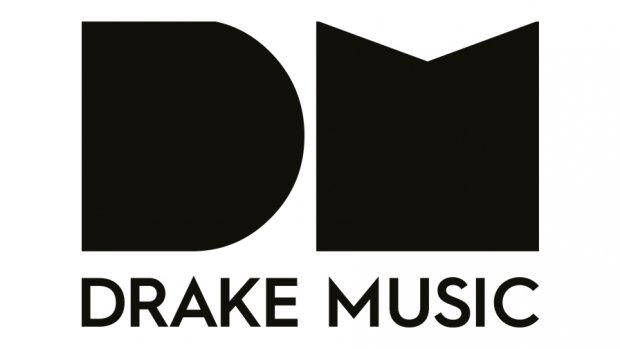 Drake Music is the leading national organisation working in music, disability and technology, and has been pioneering the use of accessible music technology for over twenty years.
Drake Music is the leading national organisation working in music, disability and technology, and has been pioneering the use of accessible music technology for over twenty years.
Drake Music is a national arts charity working across the UK with a Head Office in London. It is a National Portfolio Organisation for Arts Council England and are also funded through Youth Music. Read more about Drake Music here.
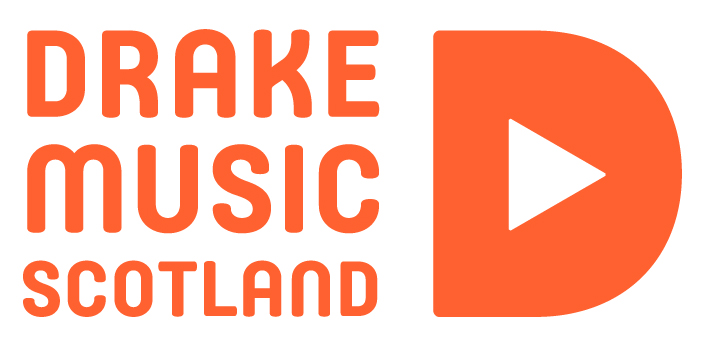
Drake Music Scotland is the nation’s leading arts organisation providing music making opportunities for people with disabilities. Our expertise in inclusive music technology and specialist teaching methods support people of all ages and a wide range of disabilities to play, learn and compose music independently.
Developing out of the Drake Research Project founded in England by Adele Drake in 1988, Drake Music Scotland became a separate charitable organisation (Registered Scottish Charity No. SC026908) in 1997 and since then has worked with over 13,000 children and adults across Scotland.
![]()

